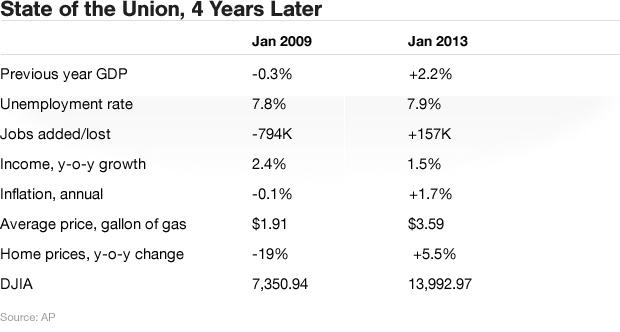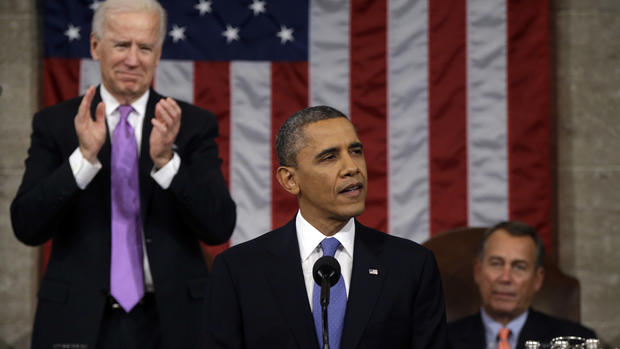State of the Union: Familiar economic themes
(MoneyWatch) President Obama's State of the Union address was as expected: part celebration of how far the nation has come from the dark days of the financial crisis; part pipe dream for government action to boost the economy further and to create more jobs; and part stump speech-cheerleading around debt reduction.
The situation has vastly improved from four years ago, when the financial system was still skating on thin ice and the economy was hemorrhaging jobs during the worst recession since the Great Depression.
When the president delivered his first address to Congress in 2009, the recession was a year old and the economy had just come off the worst quarterly contraction (-8.9 percent) since 1950. For all of 2008, the economy shrunk by 0.3 percent, while in 2012, the economy grew by 2.2 percent. Improvement, yes, but there's no escaping that the current level of growth is sub-par and well-below the average annual growth rate of 3 to 3.5 percent seen over the past 60 years.
The employment situation was dire in 2009, as job losses totaled a staggering 794,000 in January alone. (The U.S. economy lost 4.5 million jobs from November 2008 through April 2009.) Don't be fooled by the unemployment rate then - while it was a tenth lower than it is currently, it was going in the wrong direction--on the way to 10 percent later in 2009.
In his speech, even the president acknowledged that while the economy is adding jobs "too many people still can't find full-time employment."
You can say that again: a staggering 12.3 million Americans are out of work and of those, 4.7 million have been unemployed for more than 6 months. As a result of the continued difficult labor market, incomes remain under pressure, with income growth idling at only 1.5 percent.
Two measures that might have seemed like positives, inflation and gas prices, were a direct result of the recession. In fact, four years ago, the Federal Reserve was more concerned about persistent deflation than inflation. Inflation is still remarkably low, considering that the Federal Reserve has been buying trillions of dollars of bonds over the past four years.
Three metrics by which the economy has drastically improved are home prices, auto sales and stock prices. But all three have come from incredibly low levels, which can distort where things stand. In the 12 months ended January 2009, home prices were down 19 percent. Prices kept falling - eventually by a third, before bottoming in March 2012. When adjusted for inflation, house prices are stuck at late 1999 to 2000 levels.
Auto sales, which were at a 26-year low in 2009, have recovered to annual pace of 15.3 million, but are still well-below the peak level of over 20 million in July 2005. And then there's the stock market, which has risen by 90 percent from four years ago. But many investors, who were too scared to stay invested, realized losses and never got back into to enjoy the recovery.
What have you done for me lately?
OK, so we all understand that the country is better shape than four years ago, but what will propel the economy now and create new jobs? Mr. Obama introduced initiatives in manufacturing, energy, infrastructure, and housing. The "Fix-It-First" program, would "put people to work as soon as possible on our most urgent repairs", and the public-private "Partnership to Rebuild America," hopes to attract private capital to "upgrade what our businesses need most: modern ports to move our goods; modern pipelines to withstand a storm; modern schools worthy of our children."
Does some of this sound familiar? In 2011's State of the Union, the president said, "We'll put more Americans to work repairing crumbling roads and bridges. We'll make sure this is fully paid for, attract private investment, and pick projects based [on] what's best for the economy, not politicians."
Or in the 2012 State of the Union, Obama noted, "So much of America needs to be rebuilt. We've got crumbling roads and bridges; a power grid that wastes too much energy; an incomplete high-speed broadband network that prevents a small business owner in rural America from selling her products all over the world."
And who doesn't want to educate our kids? In 2011: "If we want innovation to produce jobs in America and not overseas -- then we also have to win the race to educate our kids."
In 2012: "To prepare for the jobs of tomorrow, our commitment to skills and education has to start earlier."
In 2013: "Let's do what works, and make sure none of our children start the race of life already behind. Let's give our kids that chance."
The economy is expected to grow with no spending (largely because of the Fed's easy money). The deficit is also shrinking with no spending (at least for a few year, according to CBO), which in theory should put out the fire to dial back outlays.
Maybe third time will be a charm with all of these ideas. But most of the proposals outlined that might help the economy or create jobs would require the government to spend money right now. That seems highly unlikely, when in less than three weeks, the government will be forced to cut $85 billion dollars worth of spending, known as "the sequester." Ironically, as the president discussed job creation, the Pentagon and non-defense government agencies are readying their plans to comply with the law and cut expenses and jobs.
The president warned that the cuts "would certainly slow our recovery, and cost us hundreds of thousands of jobs," a fact with which most economists agree. The Congressional Budget Office determined that the sequester would likely shave 0.5 percent from the 2 - 2.5 percent growth expected in 2013.
In the deficit arena, there has been progress. "Over the last few years, both parties have worked together to reduce the deficit by more than $2.5 trillion," and doing the math, "we are more than halfway towards the goal of $4 trillion in deficit reduction that economists say we need to stabilize our finances." Some economists suggest that the economy has been able to grow despite deficit reduction measures and without these headwinds, the economy would be doing even better.
Happily, Mr. Obama did talk briefly about the elephant in the room: skyrocketing health care costs. But the solution is not so easy. The president said that "we can't ask senior citizens and working families to shoulder the entire burden of deficit reduction while asking nothing more from the wealthiest and most powerful." The battle over future deficit reduction will center on this delicate and politically-heated balance between cutting benefits of the masses versus increasing taxes further.
And yes, the president finished the speech with pom-poms in hand.
"We are citizens. It's a word that doesn't just describe our nationality or legal status. It describes the way we're made. It describes what we believe. It captures the enduring idea that this country only works when we accept certain obligations to one another and to future generations; that our rights are wrapped up in the rights of others; and that well into our third century as a nation, it remains the task of us all, as citizens of these United States, to be the authors of the next great chapter in our American story."

